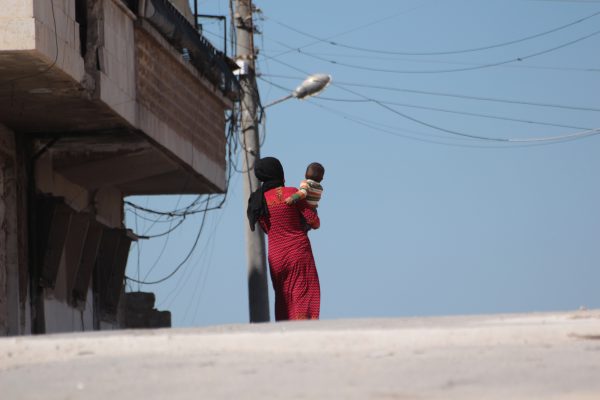Syria’s Soil Even If Thrown Above Our Bodies

A woman from Idlib's countryside carrying her son. Photo by: IWPR
Marwan’s mother (37 years old) from the countryside of Idlib, crossed into Turkey a year ago to escape death. She lived a difficult life with her family. Therefore, she decided to resort to Europe where she might get the attention and support her family needs. She spent months raising money to cover the travelling costs with her poor husband.
She decided to resort to Europe, because she heard a lot about the advantages for Syrian refugees, specifically in Germany where housing, monthly salaries and a safe environment are available.
Marwan’s mother dreamed about starting a new life in Europe, just like the rest of the families which fled of the ruthless bombing.
Her husband, Abu Marwan, rejected the idea of asylum. He wanted to stay in his homeland despite the war, and although he had lost all he had, but the fear of losing the rest of his family pushed him to get attached to them, especially that he previously lost his parents who passed away under the rubble of their old house which collapsed from the first random missile.
Marwan says, “Ever since we packed our luggage and decided to go to Germany, it was clear that my husband was anxious and afraid of the unknown”.
She adds, “We went through what the majority of people travelling to Europe go through, such as the difficulty of making a decision, the difficulty of crossing and the difficulties imposed by states on their borders for fear of the increasing flow of refugees. We noticed on the way an environment with completely different customs, traditions and language”.
Marwan’s mother arrived with her family to Germany, after 25 days of suffering, starting from Turkey, to the sea, then Greece, until they reached Germany. There, they surrendered themselves to the police to be put in the nearest camp.
Their lives began in that country but Marwan’s mother and her family didn’t like it there. They saw a different environment after they had lived in a small house in the countryside of Idlib.
“In Germany, clothes, food and daily habits are different, so is the weather, as the temperature is low compared to Idlib’s countryside, which is always sunny and where people’s cheeks are brown”, says Marwan’s mother who no longer bakes with her rough hands in the early morning and lights up the wood oven from tree sticks which her husband collected from nearby lands. Furthermore, meals in Germany are cooked as if they are for entertainment compared to the village food she was used to. “Even the color and the taste of the food are different”.
Marwan’s mother was able to tolerate everything except the strange customs in Germany, she and her conservative husband met them with rejection, she says, “We come from a conservative environment, I cannot accept my daughters without a veil and I cannot accept that they learn western customs and attend mixed schools”.
Marwan’s mother adds about the suffering of living in Germany, “Months and days went by slowly and I didn’t hear the voice of a muezzin and I couldn’t speak one word of their dry language which is nothing like us, adding to that ethics and modern education related issues which I don’t agree on”.
Therefore, Marwan’s mother and her husband decided to go back to Syria.
Marwan’s mother and her family returned to the bosom of the nation, she wasn’t the only who wasn’t satisfied with the European life, despite the good reputation of the European civilization and its evolution in terms of construction and housing. In exchange with those who went to live in it, there are some who returned like Marwan’s mother and her family who preferred dying under the rubble than living in Europe.
Marwan’s mother concludes, “Syria is different now, the war destroyed everything and death surrenders us, however, there is no heaven outside our land, and Syria’s soil, even if thrown above our bodies, will remain tender on us and better than settling outside”.
Sama Bitar (41 years old) from Idlib. She holds a high school degree and she is married with four children. She has worked in charities for more than 10 years.
